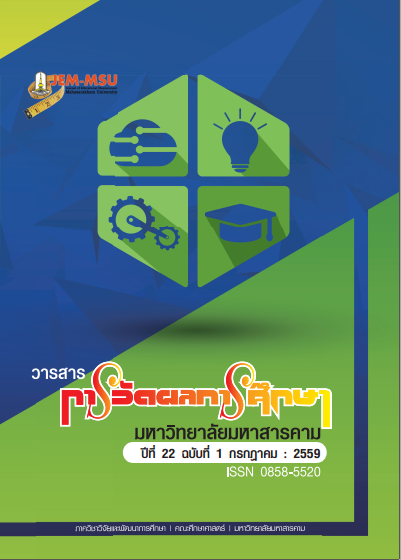The Development of Learning Experience Model to Enhance Whole Language Skills Approach in Early Childhood
Main Article Content
Abstract
The research purposes were : 1) To study problem and current state of learning
experience management for a whole language skills of early childhood, 2) To develop the
learning experience management model to enhance a whole language skills of early childhood,
and 3) To study the effectiveness of learning experience management model to enhance
whole language skills for early childhood . The samples and target group were used in this
study comprised of 260 kindergartener, including interviewing and observing for learning
management with the target group of 10 kindergarteners from schools under the Office of
Surin Primary Educational Zone 2, in the academic year of 2013, and the samples of 35
students those were provided for trying-out of learning management model. Including of 20
students for implementing to find out the effectiveness model., The instruments using for
the research were as : 1) Model of learning experience to enhance whole language skills
for kindergartners, 2) The whole language skills test for kindergartners, which comprised of
24 items, 3) The scale for assessing satisfaction with activities in learning experiences model,
for 10 item scales, and 4) The questionnaire for checking kindergarteners in opinions of
learning experiences management to enhance whole language skills for kindergartners. The
statistics using in this research were included of percentage, mean, standard deviation, and ttest (Dependent Sample) was employed in hypothesis testing.
The results of the research found that :
1. In studying and analyzing for base line information about current state of
learning experience management and whole language skills of the relevant kindergartners,
found that management of learning experience to enhance language skills had the problems
and need to improve more highly. For providing element of whole language skills were
included of 4 skills, such as listening, speaking, reading and writing skills. Whereas, the
approach and strategies for improving of whole language skills, should support with
meaningful experiences and use more variety of activities, that suitable with individual
differences of learners and obtained learning effectively. Furthermore, learning experiences
should be challenged, motivated in practice, and attained successfully with themselves.
Beyond, the approach of improving language skills effectively, should apply and integrate of
concerned theories and ideas in constructing for the learning experience model, such as
conceptual framework of Piaget ‘s intelligence theory, Vygotsky’s Sociocultural learning
theory, Brain-Based learning theory, Reggio Emilia approach, and High Scope approach.
2. For construction and trying–out of prototype model for learning experience
management model in enhancing whole language skills of kindergarteners was found that the
prototype model composed of four elements, they are : 1) principles of model, 2) objectives
of model, 3) steps for providing of learning experience, and 4) assessment of learning
experience. Proceeding of Learning process designed for improving language skills were
consisted of five steps, such as : 1) engagement, 2) confrontation of events, 3) acting in real
situation, 4) reciprocation and conclusion, and 5) application and assessment. Accordingly,
for the result of experts evaluating in quality and appropriateness of model was found at a
high level.
3. Studying for the effectiveness of learning experience management model to
enhance whole language skills of kindergartners, found that : 1) the indergartners who
learned based on that model showed a higher of whole language skills, in overall and each
aspect, than before learning at the level .05 of significance. 2) the kindergartners who
learned based on that model had learning satisfaction according to improved language
experiences learning, for overall at a high level, and 3) The opinions of teachers who
implemented that learning experience model had overall satisfaction in management of
learning experience at the high level
Article Details
The content and information contained in the published article in the Journal of Educational Measurement Mahasarakham University represent the opinions and responsibilities of the authors directly. The editorial board of the journal is not necessarily in agreement with or responsible for any of the content.
The articles, data, content, images, etc. that have been published in the Journal of Educational Measurement Mahasarakham University are copyrighted by the journal. If any individual or organization wishes to reproduce or perform any actions involving the entirety or any part of the content, they must obtain written permission from the Journal of Educational Measurement Mahasarakham University.


